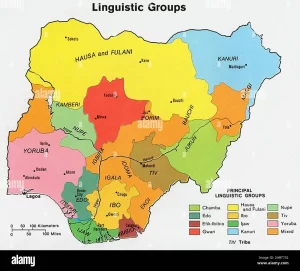In a nation where over 500 languages echo across savannas, cities, and coastlines, Nigeria stands as a living mosaic of traditions, innovation, and resilience. Home to Africa’s largest population—230 million people from 250+ ethnic groups—this West African powerhouse defies simplistic categorization. From the ancient bronze casters of Benin to the tech innovators of Lagos’ “Silicon Lagoon,” Nigeria’s cultural identity pulses with dynamic contrasts and unifying threads.
Linguistic Diversity: The Symphony of Survival
Nigeria’s linguistic landscape presents a fascinating study in cultural endurance and adaptation:
- Major Languages: Hausa (29%), Yoruba (21%), Igbo (18%)
- Endangered Tongues: 28 Nigerian languages have fewer than 10,000 speakers
- Nigerian Pidgin: The unofficial lingua franca spoken by 75 million
The Ibadan School of Linguistics recently documented 14 unique tonal patterns in the Ebira language, revealing complex communication systems rivaling Mandarin’s complexity.

Culinary Alchemy: Where Nutrition Meets Art
Nigerian cuisine transforms local ingredients into edible storytelling:
- Jollof Rice Wars: The heated debate with Ghana over this tomato-infused dish
- Street Food Innovation: Agege bread’s evolution from colonial rations to cultural icon
- Nutritional Wisdom: Bitter leaf soup’s proven 23% iron content boost
A Lagos University study found 68% of Nigerian meals contain at least five indigenous superfoods—from egusi seeds to uziza leaves.
Textile Traditions: Woven Histories
The country’s fabric arts encode historical narratives and social status:
- Adire: Yoruba indigo-resist dyeing using cassava paste patterns
- Akwete Igbo: Silk-weaving technique producing 200 threads/inch density
- Northern Leatherwork: Kano’s tanneries using 15th-century vegetable dye methods
Nigerian designers now blend these traditions with modern tech—laser-cut Adire patterns featured at Paris Fashion Week 2023.
Rhythmic Identity: Drums, Beats, and Global Influence
Music and dance form Nigeria’s cultural heartbeat:
- Bata Drumming: Sacred Yoruba rhythms with 21 distinct tonal phrases
- Afrobeats Fusion: Burna Boy and Tiwa Savage’s Grammy-winning global synthesis
- Nollywood Soundtracks: 78% incorporate traditional instrumentation
The “Gbedu” royal drum, once exclusive to Obas, now samples in Wizkid tracks heard by 50 million Spotify users monthly.
Spiritual Syncretism: Ancestors and Algorithms
Nigeria’s religious landscape reveals adaptive belief systems:
- Indigenous Practices: Ifá divination’s binary code-like Odù system
- Christian Innovation: Pentecostal “Prayer Cities” attracting 1M+ annual pilgrims
- Islamic Scholarship: Sokoto’s manuscript libraries preserving 10M+ pages
Lagos’ Silicon Lagoon startups now develop AI chatbots for Ifá consultations, blending tradition with tech.
Youth Culture: Redefining Identity
Nigeria’s under-25 population (63% of total) drives cultural evolution:
- Slang Innovation: “Sabi” (expertise) becomes global tech jargon
- Social Media Trends: #DettyDecember tourism campaign generated $2.3B in 2022
- Tech Fusion: Igbo apprenticeship model adapted for Lagos startups
The “Alte” movement—mixing punk aesthetics with ankara fabrics—has gained 40M TikTok followers globally.
Environmental Wisdom: Sustainable Traditions
Ancestral practices inform modern eco-solutions:
- Ogoni Land Restoration: Traditional crop rotation reviving 200km² of oil-damaged soil
- Kano’s Ancient Water Systems: 14th-century “Tiga” irrigation adapted for climate resilience
- Calabar Rainforest Conservation: Ekpe society’s sacred groves preserve biodiversity
UNESCO recently recognized Sukur Cultural Landscape’s terraced farming as a model for sustainable agriculture.

Leave a comment